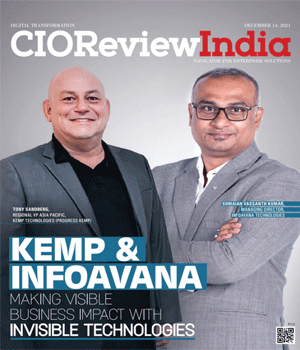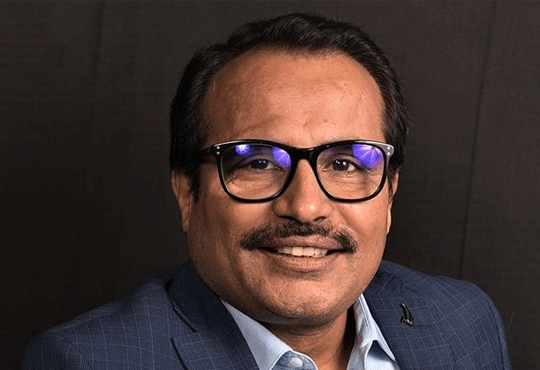
How GCCs Can Provide Value Beyond OpEx Reduction
Janifha Evangeline | Thursday, 18 November 2021, 11:31 IST
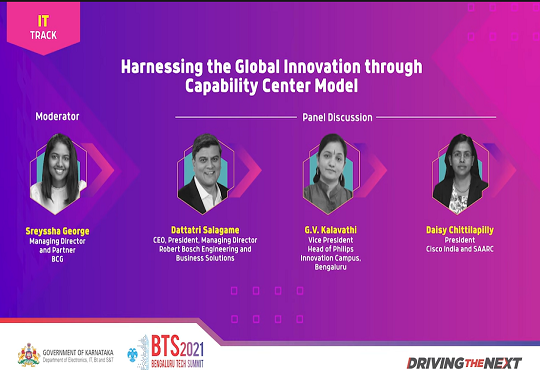
Asia’s largest technology event, Bengaluru tech summit – BTS 2021 in its 24th edition has rendered global audiences not only access to the best innovations but also to cutting-edge ideas for building a collaborative, global tech community.
One of the panel discussions that was hosted by Ms. Sreyssha George, on 17th November 2021, included panelists - Mr. Dattatri Salagame, Ms. G V Kalavathi, Ms. Daisy Chittilapilly who spoke about “Harnessing the Global Innovation through Capability Center Model.”
Over the last two decades, the Global Capability Centers or GCCs have played a major role as a bridge between India and the world. Global organizations have reaped benefits by tapping into the Indian talents and fast-maturing Indian start-up ecosystem to grow, innovate and as well as become profitable.
Global capability centers are a case in a point and these large facilities concentrate employees as well as infrastructure which handle operations such as back-office functions, corporate business-support functions, and contact centers and IT support which include app development & maintenance, remote IT infrastructure, and help desks, in order to sustain productivity growth. Some large companies use GCCs as a center of excellence for automation, innovation, and analytics.
The pre-crisis location-based model for Global Capability Centers had been perfect for years however within the span of a few days/weeks the pandemic made it obsolete and therefore Global Capability Center's physical facilities were shuttered, and enterprises had to quickly shift to remote working.
Remote working
For decades, co-location was a most important requirement for certain positions/roles in order to perform well in a GCC. However, the pandemic has shown that it is not so necessary in numerous cases, which led to a rapid re-assessment of each element of the enterprise.
While determining the right mixture of workforce capacity, executives have to look for employee availability as well as engagement in addition to ways of working and employment terms. For instance, a delivery agent can work very effectively on 100 percent of their tasks, remotely, while employees in the customer-facing roles may complete only fifty-five percent of their tasks remotely.
Next-generation remote infrastructure and facilities
As enterprises are moving for supporting onsite as well as remote work, there is a need for improving the resiliency and continuity of reliable and secure infrastructure. Leading GCC companies are beginning to invest in cloud-based infrastructures and collaborative tools in addition to Information security technologies.
The startup Ecosystem
“Like most companies, we like to look at what is the progress that we've made. So, when we bring the startups in normally, they've got great ideas, but then giving them the professional mentorship, organizational structure, guidance, etc. is that something that they look to Cisco tremendously for,” says Daisy Chittilapilly, President, Cisco India, and SAARC.
Accelerating innovation and generating employment
The country today possesses more than forty thousand startups. These startups have given employment opportunities to around 450000 plus employees. Likewise, around 1300 plus Global capability Centers in our country have directly employed over 1.3 million people and 4-5 million employees indirectly, and it generates around USD 33.8 billion in annual revenue. Most of the Global capability Centers work closely with Indian start-ups in order to obtain access to their innovative products. The other advantage is that the Indian startups obtain quality access to global markets which helps in augmenting their evolutionary journey.
Based on the analysis conducted by certain research organizations, it is estimated that the GCC segment may reach annual revenue of USD 60 billion to USD 85 billion in the coming years, and in the process, the Global Capability Centers can make additional employment of over eight to ten million employees in India and also work with numerous startups in order to generate great symbiotic value for global enterprises and India as well.
“I think we should stay focused on in the next three to four years, how the GCC should change the capability landscape. This may not be characterized by how many people you hire, but it's characterized by what kind of people you hire,” says Dattatri Salagame, CEO, President, Managing Director, Robert Bosch Engineering and Business Solutions.
“India offers a variety of talent. So, it's extremely important that we go after relevant, highly, and extremely skilled, which comes at different cost points, which is very natural. And hence, I stress on GCC's operating on multimodal formats. I would also see engagement models changing now. Talent boundaries are getting blurred, being a GCC in India, you can reach out to the talent in other parts of the world,” he adds.
Creating the future skills at scale
As major global enterprises grapple with harmoniously integrating multiply advanced and next-gen technologies that include AI/ML, blockchain, etc. in their business as well as operating models, the Global Capability Centers in the country can help significantly by creating the next-gen capabilities in significant segments. For instance, the automation capability development center in the Global Capability Center of one of the leading global Oil & gas companies.
“When I joined Phillips, this was 14 years back, we were less than 200 employees working for healthcare. We had a bigger team catering to the consumer lifestyle. But after that Philips has sharpened the direction - from a conglomerate we are focusing on the health of the company. Now if you look at Philips innovation campus, we have more than 5000 people. It not only has engineers, but we have doctors, data scientists, AI specialists, and every kind of professional who is responsible for driving end-to-end healthcare delivery,” says G V Kalavathi, Vice President Head of Philips Innovation Campus, Bengaluru.
Becoming the digital capital
“I think it would be very good if we can strengthen the partnership with the institutes because the budding talents are becoming extremely important to accomplish the goal. So how can the GCCs partner and also with the government vision that we have, how can Karnataka government and us and the universities partner much stronger to get the talent much more ready to get into this,” states G V Kalavathi, talking about how the goal of becoming the digital capital can be achieved.
The road ahead
“When the GCC started many years ago, India had a default advantage of cost and it was huge leverage which every organization looked at, but over and most of GCCs went through a period of scale, - the scale could be relative to that organization. But, when I look at the GCC 3.0, if I map 30 years of GCC story, now, we are in a 3.0 version, this is characterized by the value impact that you bring in, how near you go to the core of the product and the future strategy,” states Dattatri Salagame, CEO, President, Managing Director, Robert Bosch Engineering and Business Solutions.
“So, the KPIs have changed, the KPIs of cost, utilization, efficiency, of course, they don't go away, but they are hygiene. There is another mode of GCC working, most cases are GCCs evolved from one format to multimodal formats, while you have huge software development, which is based on efficiency being done. You also have the center for artificial intelligence working on autonomous for example. So, there you measure the value that you bring in. So, the mode of the projects is what is the value and how closer you are to the customer, the degree of ownership, or the customer impacts. These are the new KPIs and also the differentiated capabilities which are the centers of excellence etc. There are new KPIs that have emerged in GCCs. But you know, it will continue to be multimodal as we go ahead,” he concludes.
CIO Viewpoint
The Constantly Evolving Technology Landscape in...
By Janifha Evangeline
Navigating the Digitalization of Mining Industry
By Janifha Evangeline
How To Achieve An Effective Digital Transformation
By Yogendra Singh, Head-IT/SAP, Barista Coffee Company Limited
CXO Insights
No-code platforms: Enterprise-wide Adoption...
By Rahul Murthi, Director at Acies
Unleashing the Potential of IT in Engineering...
By Gyan Pandey, Head - Digital/CDO, Voltas
Low Code and Artificial Intelligence - The...


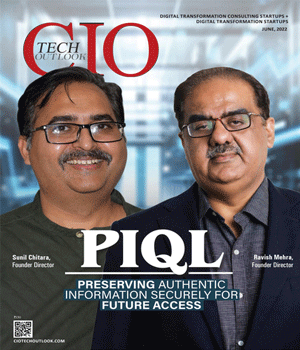
.jpg)
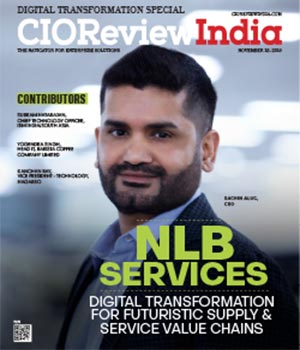
.jpg)

